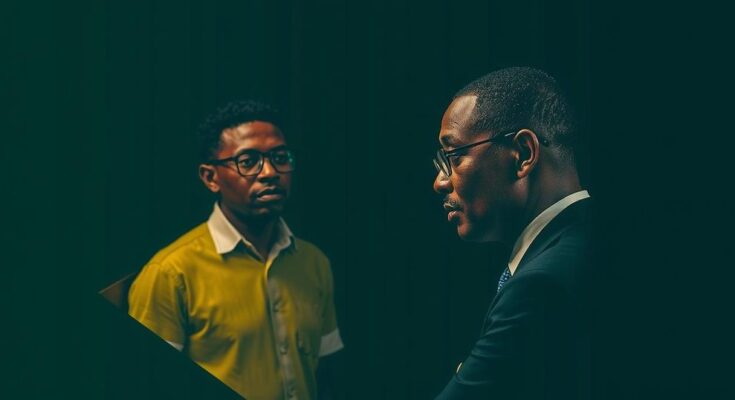In Equatorial Guinea, the Bar Association has suspended human rights lawyers Gemma Jones and Angel Obama amid political interference threatening judicial independence. Jones was punished for addressing public employee grievances in a TikTok video, while Obama faced retaliation for defending human rights advocates. Their cases reflect a wider crisis for lawyers in the country, as international law necessitates safeguarding legal independence amid governmental oppression.
In Equatorial Guinea, the legal profession faces severe political interference, jeopardizing justice and human rights advocacy. Recently, the Bar Association suspended two human rights lawyers, Gemma Jones and Angel Obama, who have consistently challenged human rights violations in the country. Jones, a Madrid-born lawyer, faced retaliatory measures following her online appeals for judicial independence. Similarly, Obama has been targeted for defending human rights defenders against arbitrary detentions. Both lawyers exemplify resilience in the face of such adversities, underscoring the critical need for an independent legal profession. The legal landscape in Equatorial Guinea is heavily influenced by the ruling government, often leading to arbitrary actions against those who dare to speak out. This is exemplified in the case of Gemma Jones, who, after denouncing public sector issues through social media, was subjected to a disciplinary process resulting in a two-year suspension from the Bar Association. Despite these challenges, she continues to advocate for justice and human rights, refusing to be silenced by the subsequent harassment she has suffered. Likewise, Angel Obama has stood firm against repression, representing individuals facing human rights abuses, including his recent representation of Joaquin Elo. The Bar Association threatened him with suspension for defending “illegal” organizations, revealing the extent of intimidation faced by lawyers striving to uphold human rights. The intertwining of Bar Association leadership with government interests significantly undermines the independence required for a fair judicial process. Equatorial Guinea is bound by international human rights treaties that mandate the protection of judicial independence. However, the current reality starkly contradicts these obligations. Organizations such as Amnesty International advocate for the immediate rescission of the suspensions against Jones and Obama, emphasizing the necessity of safeguarding the rights of legal professionals in their pursuit of justice and human rights. To establish a just legal system, the government must respect lawyers’ rights to independent associations and protect them from external political influences. Only through a robust legal framework can citizens pursue justice and hold violators accountable without fear of retribution, which underscores the importance of these actions in the national context.
The situation for lawyers in Equatorial Guinea is critical, characterized by governmental control that obstructs judicial independence. Equatorial Guinea has ratified several international human rights treaties that obligate the government to ensure the autonomy of the legal profession and judiciary. However, the reality reveals a disheartening level of political influence over legal systems, creating an environment where human rights lawyers face persecution for their advocacy. The recent suspensions of Gemma Jones and Angel Obama illustrate systemic issues impacting the legal landscape, raising concerns over access to justice and the effective protection of human rights in this context.
The ongoing suppression of human rights lawyers Gemma Jones and Angel Obama highlights the precarious situation facing legal professionals in Equatorial Guinea. In seeking to silence dissent and retaliate against those advocating for human rights, the government undermines the very foundation of justice and rule of law. To fulfill international obligations, the Equatorial Guinean authorities must reinstate these lawyers, safeguard their professional rights, and ensure the independence of the legal profession to foster a just society.
Original Source: www.amnesty.org




